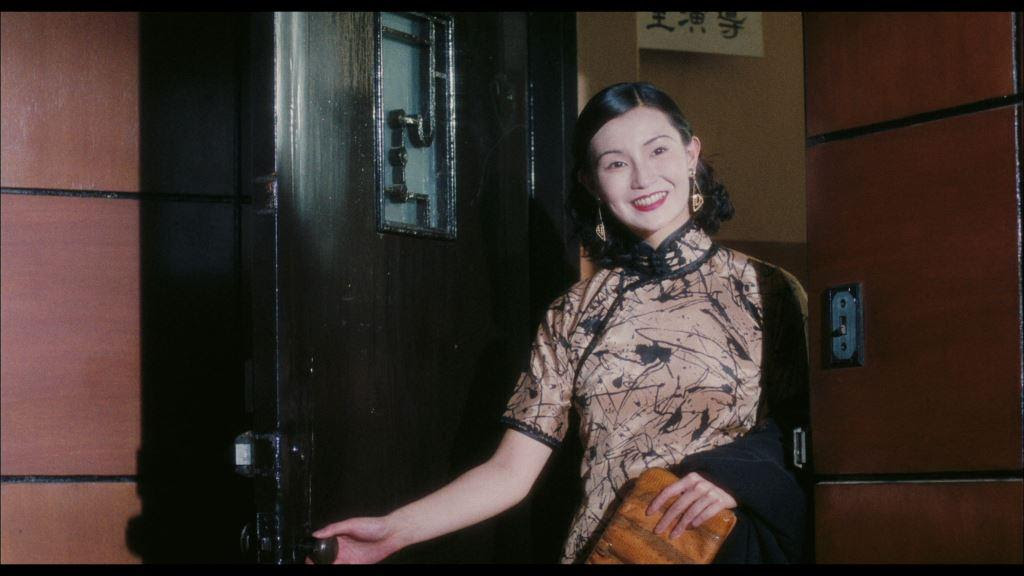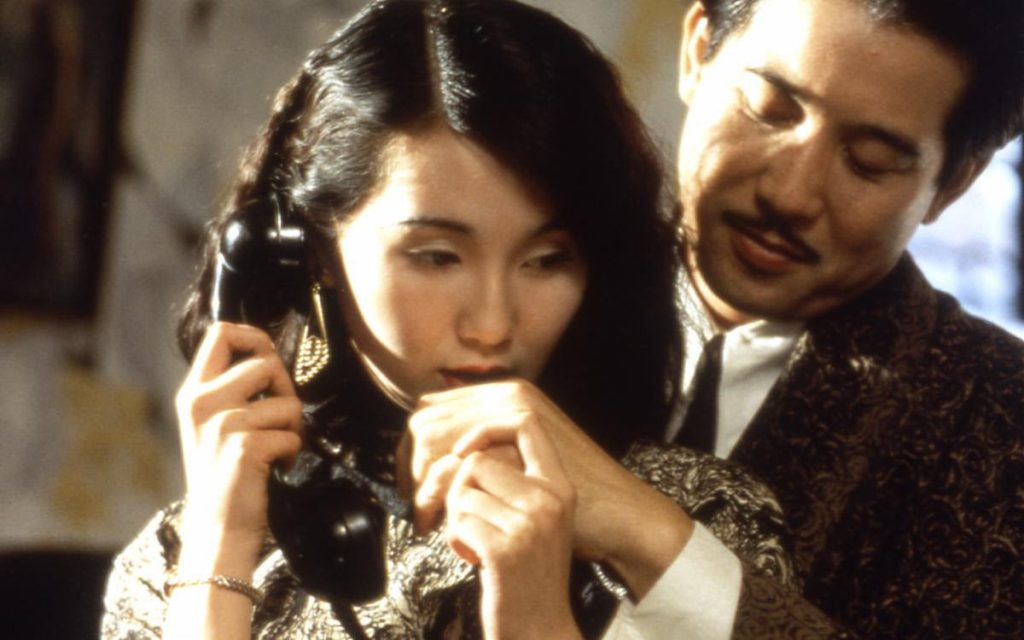It is rare for most modern audiences to know anything outside of maybe a name or two of the biggest silent film stars of yore. You could especially be forgiven if you have not heard of Ruan Lingyu, the Shanghainese silent film star whose career burned bright in the early 1930s before her tragic death by suicide at the age of 24. More than most actresses of this time period, Ruan’s legacy has endured thanks in part to the circumstance surrounding her end; tragedy has always bred fascination from the press and the public at large. The actress was a symbol of a time of prosperity for Shanghai after war but before total revolution. Ruan was a victim of societal pressures and a ruthless series of bad breaks in personal life which drove her to a permanent end. Her death rocked Shanghai in 1935 with over 300,00 people attending her funeral. Director Stanley Kwan (Rouge) knew this was a story he wanted to tell, but he did not want to tackle it in a conventional way. With 1991’s Center Stage, he created a multifaceted portrait of Ruan that blends narrative and documentary in a profound way.
You get a sense of how nontraditional this biopic is from the very first moments; we first see the cast and crew of Center Stage discussing the life of Ruan and the parallels to “contemporary” fame. Star Maggie Cheung (In The Mood For Love) remarks on how she will never experience what Ruan experienced simply due to the time in which she lives and the life she continues to live past the one that was cut short. It is a very “meta” beginning to the film, and it is far from the last. We then find Cheung embodying Ruan in a more traditional sense as she is already fairly far into her cinematic fame. One of the most intriguing parts of following Ruan through her various productions is understanding how much history has been lost over time. We get reconstructions and depictions of what it was like to film certain movies, but as the title card notes throughout many of these films have been lost with no surviving prints. Those that do have existing material utilize what is available by Kwan by inserting the actual archival footage into this new film. There are different layers of reality at every turn.

For personal taste, the film is most compelling when it is tackling this life in the traditional way. Ruan was a fascinating figure even at such a young age, and Cheung is marvelous in her depiction. We find her at a time when she was more interested in taking part in some of the revolutionary activity happening in Shanghai at the time. She also wanted to evolve her image and challenge herself on screen, and you love to see her spar with the men who did not believe she could embody the poor commoner. We glimpse her perfectionism as an artist as she commands take after take until she is happy with what she delivers. Her personal life is even more volatile as she suffers in real life as much as her characters did on screen. From her exasperating louse of a husband, Zhang Damin (Lawrence Ng), and his gambling addiction, to the subsequent divorce and affair with a tea tycoon, Tang Jishan (Chin Han), Ruan’s life is out of sorts. A very public lawsuit against her by a greedy Tang sets the tabloids ablaze and sends Ruan on a path towards total collapse. That she takes on a role of real-life actor Ai Xia in New Women which eerily mirrors her eventual demise is all the more impactful.
It is the atypical elements of the film that do not always work for me. As the film gains momentum, there are many elements that seem to slow it down as Kwan tries to weave in the documentary elements. There are some superior moments with Cheung as she delves into the ethos of Ruan and what she must have been experiencing at this time. Cheung is a figure who would experience similarities to the silent film star before and after this film, but thankfully nothing quite as tragic. Interviews with former contemporaries of Ruan likewise yield many insights into the changing political landscape and gender politics that really hit deep. Yet, there are also moments on Kwan sitting around discussing Ruan with the crew that you rather just seen acted out by Cheung. At a touch over two-and-a-half hours in length, Kwan feels the slightest bit indulgent with his choices instead of choosing to kill his darlings. Despite this, Center Stage ultimately remains quietly compelling throughout most of the runtime thanks to Cheung both as herself and as the classic star. Her story is one that should not be forgotten with the passage of time, and this film does a great job of ensuring that will not happen.

Video Quality
Center Stage comes to Blu-Ray with a new digital AVC encoded 1080p transfer in its original 1.85:1 derived from a digital 4K restoration from the original camera negative. The presentation looks pretty excellent throughout most of the runtime with only minor issues here and there. There are occasional minor specks of print damage, but overall clarity and detail is mighty impressive. The shots taking place on movie sets specifically are packed with little details in the production design that are easily noticeable thanks to this transfer. The picture tends to run a bit soft in long shots, likely to be contributed to the source material, but colors are well saturated in a visually splendid way. Skin tones are natural and consistent with subtle facial features easily noticeable in closeup. Black levels hold up well with very little in the way of crush. Digital noise does not present as a major issue here. This presentation is very beautiful and likely looks better than it ever has before. Film Movement Classics has done a fantastic job with this one.
Audio Quality
The Blu-Ray disc comes with a very capable LPCM 2.0 track in the original Cantonese and Mandarin with optional English subtitles. The beautiful music sounds great throughout the duration of the film, as it settles you into the emotions of the characters. There is never a moment where it threatens to overwhelm the dialogue, and the track maintains a good balance so that dialogue comes through clearly. Environmental sounds such as rain or the chattering of crew members on a movie set are rendered well alongside everything else. There does not seem to be any majorly noticeable instances of age-related wear and tear outside of a few audio fluctuations between the narrative and documentary material. Film Movement Classics has given this film the perfectly preserved, faithful audio presentation it deserves.

Special Features
This Blu-Ray set includes a multi-page booklet featuring the essay “A Face For The Heavens” by writer Aliza Ma. The essay provides a great amount of historical context which this film tackles as well as an analysis of the construction and themes of the story. The on-disc special features are as follows:
- Stanley Kwan 2021 Introduction: A minute-long introduction from the director in which he reflects back on how lucky he was to be able to make this film.
- Stanley Kwan Interview: A 12-minute vintage interview with Kwan in which he discusses what drew him to the project, the legacy of Ruan Lingyu, the script development, the stylistic choices he made within the film and more.
- Paul Fonoroff Interview: A 14-minute interview with film critic Paul Fonoroff in which he discusses the life of Ruan Lingyu, her work on screen, her tragic death and more.
- Trailers: The two-minute trailer for Center Stage is included here. There are also trailers provided for Shanghai Triad, The Wild Goose Lake and Raining In The Mountain.
Final Thoughts
Center Stage takes a complex look at a fascinating film star of a bygone age. Its experimental tendencies do not always resonate thematically, but the traditional biopic elements are strong enough to weather some of the perfunctory documentary additions. Maggie Cheung is outstanding in a lead role that radiates with a magnetism that suits the performer like a glove. The new Blu-Ray from Film Movement Classics offers a top-notch A/V presentation and a few interesting supplemental additions. Fans of Chinese cinema or film history in general should find a lot to appreciate here. Recommended
Center Stage is currently available to purchase on Blu-Ray, DVD and Digital.
Note: Images presented in this review are not reflective of the image quality of the Blu-Ray.
Disclaimer: Film Movement Classics has supplied a copy of this disc free of charge for review purposes. All opinions in this review are the honest reactions of the author.

Dillon is most comfortable sitting around in a theatre all day watching both big budget and independent movies.







